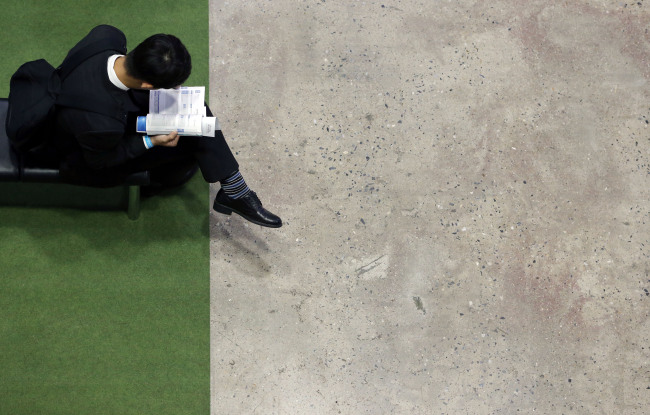Today’s university students lead a very hectic life, bogged down by worries of getting a job after graduation at time when the unemployment rate has peaked in Korea.
For them, qualifications such as having a high GPA, work experience and extracurricular activities are deemed necessary, even just to apply for a job opening.
Universities, in an effort to support students better prepare for the future, offer an array of programs, especially those that provide them with hands-on experience outside the campus.
But do universities really care about the students?
 |
A job applicant looks at an information brochure detailing job openings. (Yonhap) |
Some private colleges recommend the students to do internships as a helpful way to make the college experience more fulfilling, allegedly to hit two birds with one stone -- earning credits while doing internships. This, however, is not the complete picture.
A closer inspection of the policy of providing opportunities to earn college credits in a seemingly have-it-all, ideal manner, reveals a side that is not quite as clean-cut.
Universities are faced with the dilemma of trying to have students work but enrolled in classes at the same time.
The policy suggests that a student must be enrolled full-time if he or she wishes to earn credits for doing internships. The amount of credits students can receive depends on how long they work as an intern. For example, students can receive one credit for a month of work experience, three credits for two, six credits for three and nine credits for four or more months.
Students can earn up to nine credits depending on the duration of the internship program but they have to be enrolled full-time, meaning that they have to pay the entire tuition fee of over 4 million won ($3,464) for a semester.
“I don’t see any logical way to explain the policy. To me, it only seems like the university is bargaining with students to buy college credits,” said Park Eun-kyung, a 21-year-old student of a Seoul-based private college.
Another student of the same college said that it is simply impossible to be a full-time college student and also work as an intern simultaneously.
When asked to clarify the reason behind such a system, the college did not provide a clear answer.
“This is just what the school has decided. There is nothing I can do about it,” said Kim, the official in charge of the program.
Besides, the recently adopted policy does not seem to have exact guidelines, leaving questions unanswered.
The problem is that different rules apply to different cases. Up until last semester, the college imposed a different policy in which students did not have to pay to earn credits. A certain amount of internship guaranteed students of college credit without having to pay the full tuition.
For many students, it may be hard to believe there’d be anyone who is willing to pay the whole tuition just to get a few college credits. Those for whom money is of no concern, however, the matter may be different.
Some college students are aided by their parents, some are even supported by financial aid provided by their parents’ company so that it is not much of a financial burden for them to let a semester go working as an intern while paying the full tuition.
No one can clearly explain why the burden is on the students when universities, on the surface, wish to “support” the students. No doubt, university students need to earn a certain number of credits in order to graduate. Universities abusing this simple truth to squeeze money out of poor college students may sound improbable and yet the ground realities are different.
It seems very ironic that the university imposes such illogical and unfair policy on students while encouraging them to have a real life experience working as an intern.
By Lee Hye-won (
hyewonlee@heraldcorp.com)








